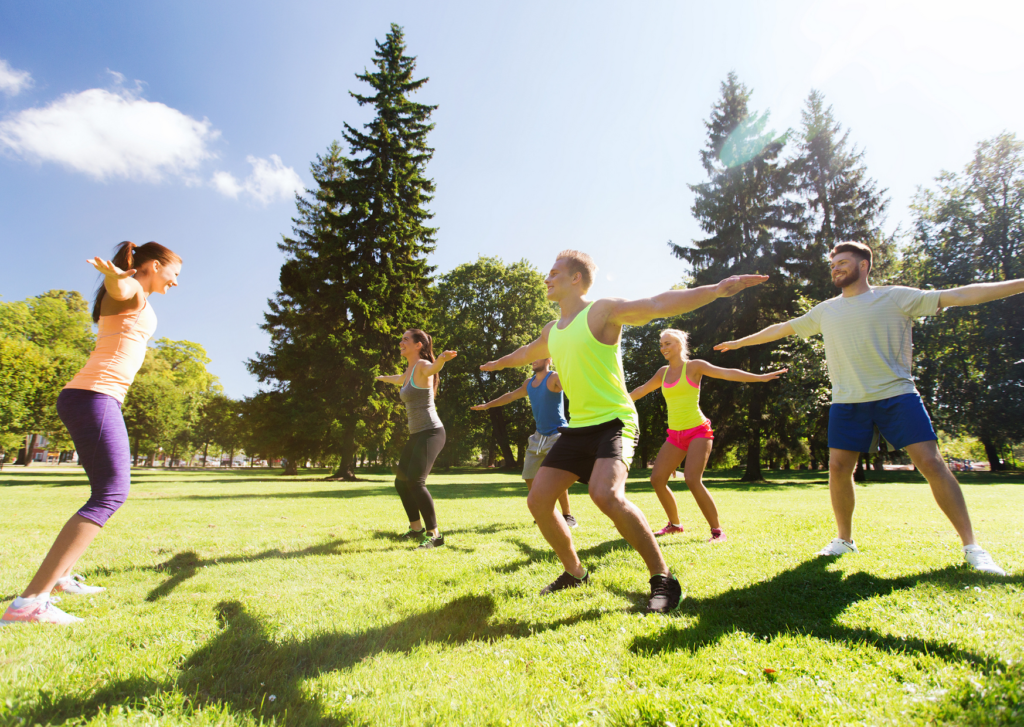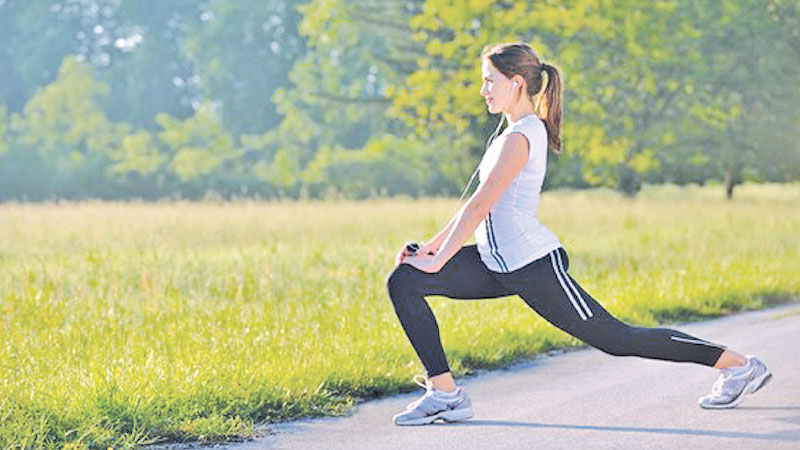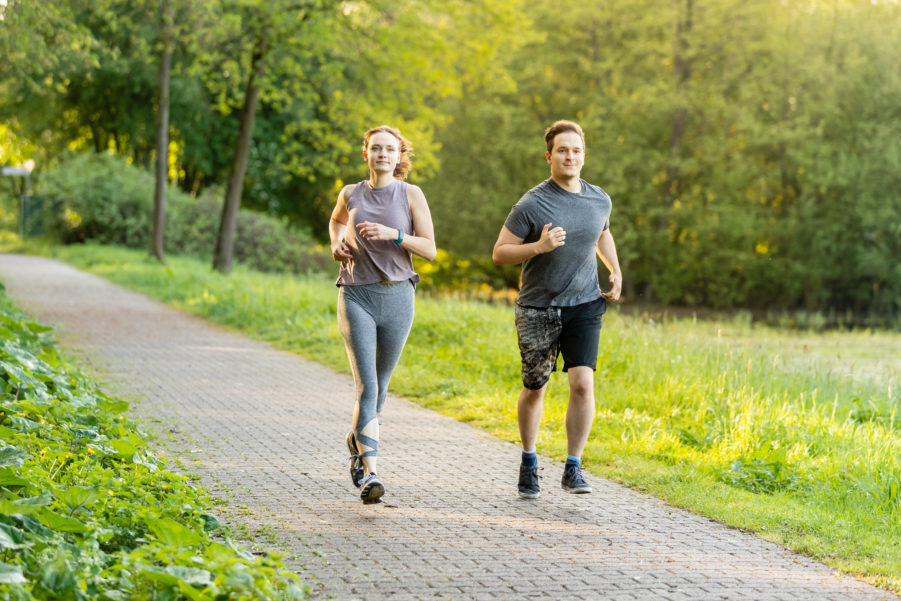
Outdoor exercise offers numerous benefits for physical and mental well-being. In this article, we will explore the advantages of engaging in physical activity outdoors, including improved fitness, enhanced mental well-being, vitamin D production, increased social interaction, a boosted immune system, reduced stress levels, opportunity for varied workouts, connection with nature, increased productivity and focus, and cost-effectiveness as a fitness option.
Improved Physical Fitness

Engaging in outdoor exercise leads to improved physical fitness. Activities such as running, cycling, hiking, or playing sports outdoors provide an opportunity to challenge your body and increase cardiovascular endurance. When exercising outdoors, you can benefit from varied terrains, which engage different muscle groups and enhance overall strength. For example, running on trails can improve balance and stability compared to running on a treadmill.
What is Outdoor Physical Activity?
Outdoor physical activity refers to any form of exercise or movement performed outside of enclosed spaces, such as gyms or fitness studios. It encompasses a wide range of activities, including walking, running, cycling, swimming, hiking, playing sports, or participating in group exercise classes held in parks or open-air venues. Engagingin outdoor physical activity allows individuals to reap the benefits of exercise while enjoying the natural environment and fresh air.
Enhanced Mental Well-Being

Outdoor exercise has a positive impact on mental well-being. Spending time in natural environments promotes relaxation, reduces anxiety, and improves mood. Research has shown that exposure to nature can lower the levels of stress hormones in the body, leading to a greater sense of calm and well-being. Additionally, outdoor exercise stimulates the release of endorphins, also known as “feel-good” hormones, which contribute to an overall sense of happiness and contentment.
Vitamin D Production
Exercising outdoors exposes you to natural sunlight, allowing your body to produce vitamin D. Vitamin D is essential for maintaining healthy bones and teeth, regulating the immune system, and supporting overall well-being. Adequate vitamin D levels have been linked to a reduced risk of various health conditions, including osteoporosis, heart disease, and certain types of cancer.
Increased Social Interaction
Participating in outdoor activities provides opportunities for social interaction and connection. Whether you join a group exercise class in the park, play team sports, or go for a walk with friends, outdoor exercise allows you to meet new people, strengthen existing relationships, and build a sense of community. Social interaction during physical activity can enhance motivation, accountability, and enjoyment of the exercise experience.
Boosted Immune System
Exercising outdoors contributes to a stronger immune system. Spending time in nature exposes you to diverse environmental elements, such as bacteria and allergens, which can help build resilience and improve immune function. Additionally, moderate outdoor exercise has been shown to increase the production of white blood cells, which play a crucial role in fighting off infections and diseases.
Reduced Stress Levels
Outdoor exercise is an effective way to reduce stress levels. The combination of physical activity and exposure to natural surroundings has a calming effect on the mind and body. Engaging in outdoor activities like walking or gardening can promote relaxation, improve sleep quality, and alleviate symptoms of stress and anxiety. Being surrounded by nature’s beauty can also provide a welcome distraction from daily worries and responsibilities.
Opportunity for Varied Workouts
Exercising outdoors offers a wide range of options for varied workouts. Unlike indoor gyms with limited equipment, the outdoor environment presents numerous opportunities to engage different muscle groups and challenge your body in various ways. For example, you can incorporate bodyweight exercises using park benches or playground equipment, utilize natural obstacles for obstacle course training, or take advantage of the resistance provided by hills or stairs for cardiovascular workouts.
Connection with Nature
Engaging in outdoor exercise allows for a deeper connection with nature. Being surrounded by green spaces, trees, and fresh air provides a refreshing and rejuvenating experience. Studies have shown that spending time in nature can enhance cognitive function, improve attention span, and increase feelings of vitality. Whether exercising in a local park, hiking through a forest, or swimming in a lake, connecting with nature offers a unique and fulfilling exercise experience.
Increased Productivity and Focus
Engaging in outdoor exercise can significantly boost productivity and focus in other areas of life. Physical activity stimulates blood flow to the brain, enhancing cognitive function and improving mental clarity. Taking a break from indoor environments and engaging in outdoor exercise can also prevent feelings of stagnation and mental fatigue. Research has shown that individuals who engage in regular outdoor exercise often experience increased creativity, problem-solving abilities, and overall productivity.
Cost-Effective Fitness Option
Outdoor exercise is a cost-effective fitness option compared to gym memberships or purchasing exercise equipment. Many outdoor activities require little to no equipment, making them accessible to people of all income levels. Running, walking, hiking, and cycling only require appropriate footwear and clothing, while bodyweight exercises can be performed without any additional equipment. Parks and public spaces often offer free or low-cost facilities for outdoor exercise, further reducing financial barriers to staying active.
Can a Woman’s Outdoor Lifestyle Improve Her Health?

Yes, a woman’s outdoor lifestyle can greatly improve her health. By incorporating outdoor exercise into her routine, a woman can experience the benefits mentioned earlier, such as improved physical fitness, enhanced mental well-being, boosted immune system, reduced stress levels, and increased social interaction. Additionally, outdoor exercise can provide specific advantages for women’s health.
For example, regular outdoor exercise has been shown to have positive effects on hormonal balance. Physical activity can help regulate menstrual cycles, alleviate symptoms of premenstrual syndrome (PMS), and reduce the risk of conditions like polycystic ovary syndrome (PCOS). Furthermore, outdoor exercise can contribute to weight management, which is important for overall health and reducing the risk of chronic diseases like diabetes and cardiovascular conditions.
In terms of bone health, outdoor exercise that involves weight-bearing activities, such as walking or hiking, can help increase bone density and reduce the risk of osteoporosis, a common concern for women as they age. The combination of vitamin D production from sunlight exposure and weight-bearing exercises further strengthens bone health.
Moreover, engaging in outdoor exercise during pregnancy can provide numerous benefits for both the mother and the developing baby. Moderate-intensity physical activity, like walking or prenatal yoga in natural surroundings, can improve mood, promote healthy weight gain, reduce the risk of gestational diabetes and preeclampsia, and aid in postpartum recovery.
Overall, embracing an outdoor lifestyle and incorporating outdoor exercise into daily routines can significantly contribute to a woman’s overall health and well-being.
Is Walking Outdoors a Good Workout?
Yes, walking outdoors is an excellent workout that offers numerous benefits. Walking is a low-impact activity accessible to people of all fitness levels and ages. Here are some reasons why walking outdoors is a good workout:
- Cardiovascular Health: Walking briskly outdoors increases heart rate, improving cardiovascular fitness and strengthening the heart muscle. It enhances blood circulation, lowers blood pressure, and reduces the risk of heart disease.
- Weight Management: Walking at a moderate pace burns calories and contributes to weight management. Maintaining a regular walking routine can help with weight loss or weight maintenance goals when combined with a balanced diet.
- Joint Health: Walking is gentle on the joints compared to high-impact exercises like running. It helps improve joint flexibility and strengthens muscles around the joints, reducing the risk of injuries and conditions like osteoarthritis.
- Mental Well-being: Walking outdoors provides an opportunity to connect with nature, which has a positive impact on mental health. It reduces stress, improves mood, boosts creativity, and enhances overall well-being.
- Bone Strength: Weight-bearing activities, such as walking, stimulate bone remodeling and increase bone density. Regular walking can help maintain strong bones and reduce the risk of osteoporosis.
- Improved Digestion: Walking after meals can aid digestion and promote better gastrointestinal health. It can prevent issues like bloating and indigestion by stimulating movement in the digestive system.
- Longevity: Research suggests that regular walking is associated with increased lifespan and reduced mortality rates. It is a simple yet effective way to promote longevity and overall health.
To make the most of your walking workout, aim for at least 150 minutes of moderate-intensity aerobic activity per week, or 75 minutes of vigorous-intensity activity. Find scenic routes, parks, or nature trails to add variety and enjoy the benefits of outdoor surroundings while getting your steps in.
Conclusion
Outdoor exercise offers a plethora of benefits for physical and mental well-being. From improved physical fitness and enhanced mental well-being to vitamin D production and increased social interaction, the advantages of engaging in outdoor physical activity are vast. Additionally, outdoor exercise provides opportunities for varied workouts, fosters a connection with nature, increases productivity and focus, and serves as a cost-effective fitness option. So, lace up your shoes, step outside, and experience the multitude of benefits that await you in the great outdoors.













